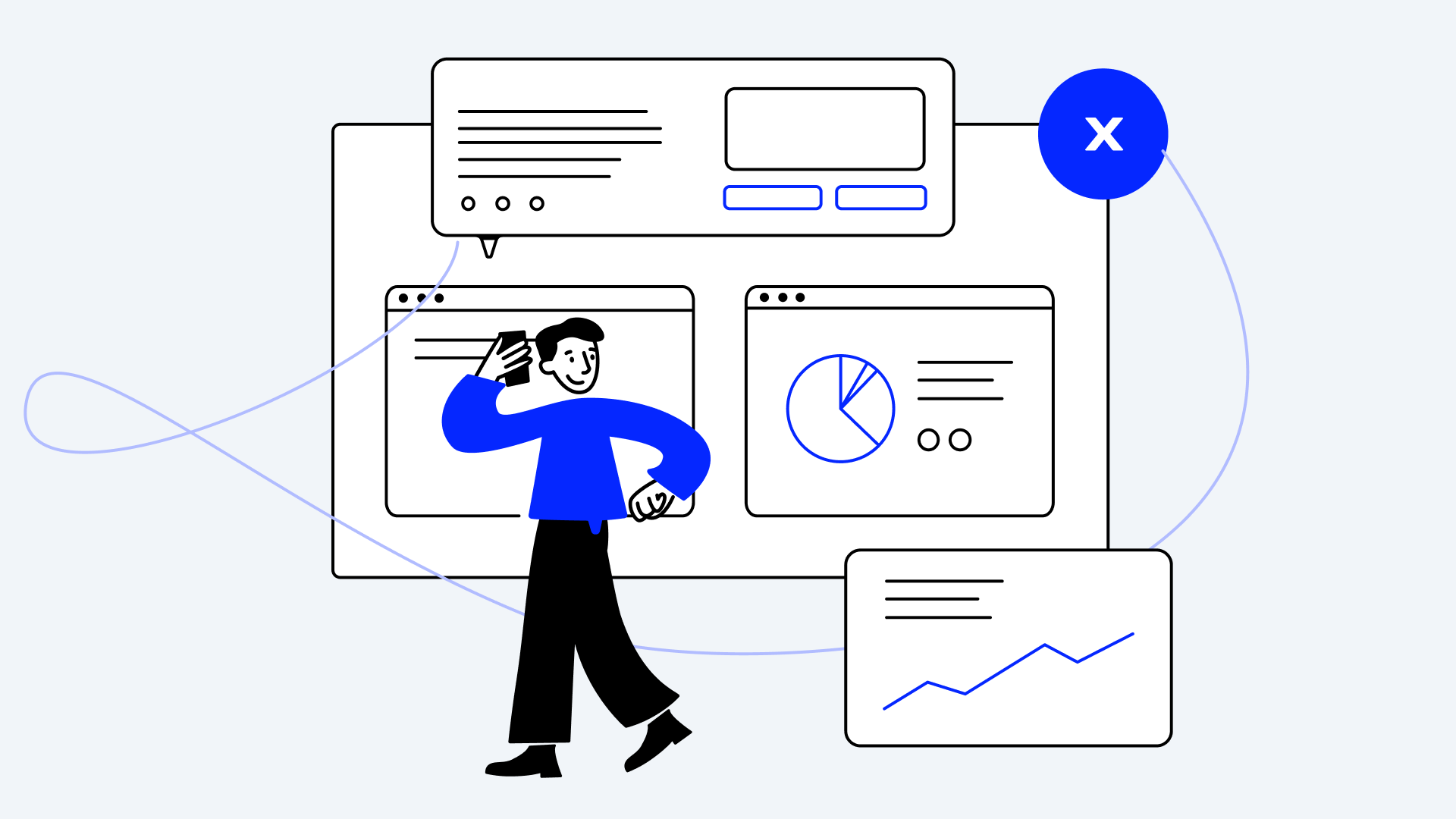Call Management Software: Top 9 Best Providers For 2024

It doesn’t matter how good your customer service is if people never get to talk to your team. Discover the top 9 call management software providers on the market in 2024 and level up your routing today.
Do You Even Need Call Management Software?
Often, businesses don’t know that they have a call management problem, let alone that they need call management software to solve it.
How do you know you’re a candidate for Call Management Software?
- You have a high call volume;
- You transfer a lot of calls;
- You miss a lot of calls;
- You’re international;
- You’re growing;
- You use a CRM.
Top Features Of Call Management Software
Few people realize that call management software does more than just routing. Beyond controlling who gets which calls when, it allows you to automate repetitive tasks, collect data, optimize performance, and improve experiences across the board.
- Business Hours: Maintain a personalized customer experience outside of business hours or when your team is busy with other calls.
- Call Recording: Automatically record and access your agents’ calls directly from your browser, and finetune your outbound calls.
- IVR: Streamline your callers’ journey with a multi-level Interactive Voice Response menu and lead them to where they need to be.
- Call Analytics: Get a 360° view of everything happening within your team and maintain unprecedented control over their performance.
Benefits Of Call Management Software
So, you’ve seen some of the most sought-after features CMS provides, but how do they translate into better customer service and more efficient operations? Here are just a few of the many advantages you can enjoy after incorporating Call Management Software into your company.
- Better Customer Service: Create custom call flows to match your customers’ needs. Ensure everyone leaves your calls satisfied.
- Cost-Efficiency: Get the most bang for your buck from each call. Use self-service and the various routing options to utilize your whole team efficiently.
- Simple Call Handling: Match callers with the right agent every time and streamline each interaction with the Real-Time Customer Card and CRM integrations.
- Self-Service: Help callers solve their issues quickly. Remove the need to speak to a rep by using an intelligent Interactive Voice Response system.
Script Your Success and Land More Deals
The 9 Best Call Management Software Providers In 2024
#1 CloudTalk
Cloudtalks’ benefits
CloudTalk is a cloud-based call center and business phone system built to maximize your customer support efforts across all channels. All you need to do is choose a number for one of the 160+ supported countries, and you can instantly start optimizing your workflows with advanced features, including IVR, click-to-call, power dialers, and more! CloudTalk also supports 35+ other powerful integrations for helpdesk, e-commerce, and CRM systems, including HubSpot and Zendesk.
Key features
- High-quality calls with guaranteed latency and minimal jitter
- Smooth workflow with our Intelligent call-routing tools
- Callback feature that redials the number until connected with the agent
- Redirecting calls during busy hours or when outside the office
- The call masking feature keeps your personal number private
What is CloudTalk missing?
According to some users, CloudTalk Analytics needed a refresh, something that would afford our users deeper insights into the data that drives their business forward.
We answered the call and recently launched Analytics 2.0, a powerful new data-visualization framework that gives users in-depth reports on the day-to-day operations of their call center. Identify problem areas and apply data-driven solutions faster than you ever thought possible.
What Type of Business Is It Best For?
CloudTalk is the perfect phone system for mid-sized companies looking to grow. Typically, it’s used in sales for outbound calls and in customer service for inbound calls.
Pricing
#2 Openphone
OpenPhone helps small to large businesses set up international phone lines to manage internal and external global calls or messages. You can handle all your call center interactions while working from anywhere.
Openphone’s benefits
OpenPhone has an intuitive user interface with applications that work on any platform. Features like call recording, customizable IVR, and extensions make OpenPhone a great solution for customer support teams
OpenPhone Unique features
- API.
- Automated Attendant.
- Call Center Management.
- Call Logging.
- Call Recording.
What Type of Business Is It Best For?
OpenPhone is an all-in-one phone system for teams. It brings your business calls, texts, and contacts into one delightful app that works anywhere.
What is OpenPhone missing?
OpenPhone lacks many features essential for sales teams, such as auto dialers, click-to-call, and open API support that can help users expand the range of available integrations. Customers often complain about the low number of apps the software connects with. Additionally, the Standard option only includes calling and messaging the U.S. and Canada.
Pricing
#3 Google Voice
Google Voice has been on the market since 2009. It offers both free and paid versions to customers. Google Voice has many useful features, such as call forwarding, ring groups, and Google Meet and Calendar integrations. The biggest disadvantage of Google Voice is the lack of a desktop application.
Google Voice’s benefits
The free version of Google Voice offers unlimited calling within the US and Canada, which is ideal for companies with a domestic client base. The provider also includes Call recording as part of all of their plans. Implementation is fairly simple, too: you can be up and running within minutes. Last but not least, Google Voice’s customer support is there for you 24/7.
Key features
- SIP Link
- Unlimited text messaging in the US
- Google Meet integration
- Google Calendar integration
- Voicemail transcription
- Call forwarding
- Multi-level auto attendant
- Ring Groups
- Advanced reporting (BigQuery)
- Ad-hoc user call recording
What is Google Voice missing?
To access Google Voice, you must have a US phone number.
The platform also lacks popular integrations, like Slack or Zapier.
Google Voice also has certain feature limitations. You won’t get Toll-free numbers, Smart dialer, Automated Call Distribution, Call monitoring, Contact management, IVR, or reporting and analytics.
What Type of Business Is It Best For?
Google Voice is best suited to companies that are just starting. The provider is often listed as one of the best virtual phone services for small businesses, but all sizes will find something to benefit from.
Pricing
#4 Nextiva
Nextiva is a big player in the VoIP market, providing services to more than 15,000 customers. Nextiva is widely regarded as user-friendly — users can start calling within minutes thanks to a simple and intuitive setup process. Furthermore, the system is hosted by Nextiva, which makes maintenance of the software Nextiva’s responsibility.
Nextiva’s benefits:
Nextiva offers various advanced features, including conference calling, voicemail transcription, multi-level attendant, and much more. The provider also integrates with solutions like Zendesk, ConnectWise, or MS Teams.
Nextiva’s HIPAA-compliant virtual faxing makes it a great solution for healthcare workers. Medical employees can share information without having to worry about data breaches.
Furthermore, 24/7 support means agents are always on hand to assist you.
Key features
- Unlimited Calling
- Video Conference Recordings
- Mobile & Desktop Apps
- Workflow Optimization
- Omnichannel Communications
What is Nextiva missing?
Although Nextiva is a well-known VoIP solution, there are some issues you should know about when considering this provider:
- Integrations: Nextiva is missing certain integrations, like Slack or Zapier. With Zapier, users can connect their VoIP telephony system with thousands of non-native systems.
- Prices: Many consider Nextiva’s prices high, especially for small businesses.
What Type of Business Is It Best For?
Businesses need a robust, secure, and reliable enterprise phone system that works across every device and has advanced features like video conferencing, mobile apps, call recording, and more.
Pricing
#5 RingCentral
When you think about VoIP telephony solutions, RingCentral is among the first ones that come to mind. It’s no wonder the company has been on the market for over 20 years and has built quite a reputation.
RingCentral’s benefits:
RingCentral has a great variety of features and offers HD-quality voice and video. The provider is a good fit for enterprises since it provides an omnichannel experience, lead qualification tools, management, collaboration, and performance features – all in a single software.
Key features
- SIP Trunking
- IVR
- Call Recording
- Call Routing
- Contact Management
What is RingCentral missing?
Despite all the positives, RingCentral lacks many essential tools that modern businesses require.
Features like native sentiment analytics, Speech-to-Text transcription, smart dialers, or Skill-based routing are only included in Contact Centre Solution. The same goes for some agent management features, like monitoring.
The Call recording tool and Toll-free numbers are only available as add-ons for an additional cost.
Furthermore, RingCentral’s implementation can take as much as 90 days and involves an implementation fee.
RingCentral UI is also not always the friendliest to work with.
What Type of Business Is It Best For?
RingCentral MVP is a flexible cloud-based solution ideal for businesses of all sizes.
Pricing
#6 Vonage
Vonage is among the best-known virtual phone providers in the world. They’ve been in the business for over 20 years and have established an enviable market leader reputation.
Vonage’s benefits
- The Virtual Receptionist automatic attendant feature allows calls to be forwarded to other departments.
- Moreover, businesses can provide callers with alternatives for call routing that let them use either their name or an extension to dial. Before having their calls routed to a department, callers can also use the company directory.
- Even when businesses use cloud services that consume a lot of bandwidth, such as collaboration, chat, and video tools, Vonage’s network optimization features ensure call continuity and call quality.
Key features
- Stability and reliability
- Auto-attendant
- CRM integrations
- Voice and video conferencing
- Call forwarding services
What is Vonage missing?
Unfortunately for customers, Vonage has capitalized on its reputation by charging much more for its services than other comparable virtual phone software providers.
Vonage pricing also includes many hidden fees that make the service far more expensive than expected.
This can be a real downside for small businesses that need to be more discerning about how and where they expend their resources.
What Type of Business Is It Best For?
Vonage is best for companies looking for a well-established provider.
Pricing
#7 Grasshopper
Grasshopper is often the go-to VoIP solution for smaller businesses looking for call center software to streamline their operations worldwide. But is their business model so SMB-friendly? Let’s see.
Grasshopper’s benefits
- Set up is simple and takes just a few clicks — no IT degree required.
- The Solo pricing tier is very affordable, even for companies that are just starting. Furthermore, extensions are unlimited after you reach the Small Business service tier.
- There is no need to purchase pricey new equipment. You can run your business from your personal smartphone while keeping it separate from the rest of your life.
Key features
- Voicemail transcription
- Custom greetings
- Simultaneous call handling
What is Grasshopper missing?
However, Grasshopper’s simplicity has a downside: The solution lacks several core VoIP features users may expect, including:
- call recording,
- power dialers,
- and even click-to-call.
Furthermore, a few users complain that the app could benefit from deeper reporting features.
What Type of Business Is It Best For?
Grasshopper is best for SMBs who value their customers’ happiness above all else.
Pricing
#8 Aircall
Aircall is an advanced calling solution used by 15,000+ clients. It’s designed to speed up sales processes, boost communication with prospects, and close more deals. You can automatically dial multiple candidates in a back-to-back queue and surface crucial contact information directly within the phone interface.
Aircall’s benefits
Aircall excels when it comes to automation. The provider also features many useful integrations, including Intercom, Pipedrive, and Zapier. Furthermore, it offers Advanced automation tools, user-friendly apps, and reliable customer support.
Key features
- Automatic Call Distribution
- Call Monitoring
- Call Transfer
- Call Recording
- Call routing
What is Aircall missing?
Aircall lacks some essential video-calling features. Webinar hosting and screen-sharing capabilities are severely limited on the platform, which can lead to a fair amount of frustration for users.
What Type of Business Is It Best For?
Aircall is a calling software primarily targeted at small businesses using the phone to conduct sales and support business daily, but certainly not all of them. Think about how frequently your team uses smart dialers. You might consider looking elsewhere if they’re a core part of your day-to-day work.
Pricing
#9 Ooma
Ooma is an ideal solution for smaller companies with up to 500 employees or a home phone service. It is mostly used for call logging, alerts, and escalations.
Ooma’s benefits
- Simple set-up: you can install the phone system without any technical expertise, and it comes pre-configured.
- Feature-rich mobile app that is compatible with both iPhones and Android devices.
- Ooma’s Virtual Receptionist is a great option for managing calls for your company. You can program a personalized welcome, direct callers to various extensions, or offer a menu of choices that can direct callers to the appropriate party.
Key features
- voicemail-to-email forwarding
- caller ID or video conferencing
- desktop and mobile apps for Android and iPhone
What is Ooma missing?
Although the setup is very simple, and you can seek assistance from guides or customer support, no in-person training is involved.
Ooma also doesn’t offer predictive dialers and telemarketing management. These features speed up your workflow and make your sales efforts much smoother. Ooma lacks reporting and analytics capabilities.
What Type of Business Is It Best For?
Ooma is best for smaller businesses looking for a basic VoIP service.
Pricing
What did you find in this article?
What is call management software?
Call management software is a digital tool that streamlines and organizes the handling, routing, and tracking of incoming and outgoing calls in a business, ensuring efficient communication and improved customer service.
What is a call management CRM?
A call management CRM integrates call management features with customer relationship management, allowing businesses to track calls, manage contacts, and analyze communication data within a unified platform, optimizing customer interactions.
What is the use of call management?
The primary use of call management is to optimize inbound and outbound communications, reduce wait times, ensure efficient call routing, and provide insights through analytics, all of which contribute to improved customer satisfaction and business efficiency.
How to choose a good provider of Call Management Software?
Consider these four key factors:
1. Look at different pricing options to find a plan that offers the features you need within your budget.
2. Ensure the provider has a strong track record of reliability and offers high uptime guarantees, minimizing the risk of service interruptions.
3. Choose a provider that offers excellent customer support and a straightforward onboarding process to facilitate a smooth transition to the new system.
4. Research the provider’s reputation through online reviews and testimonials to gauge customer satisfaction and the software’s performance in real-world scenarios.






















